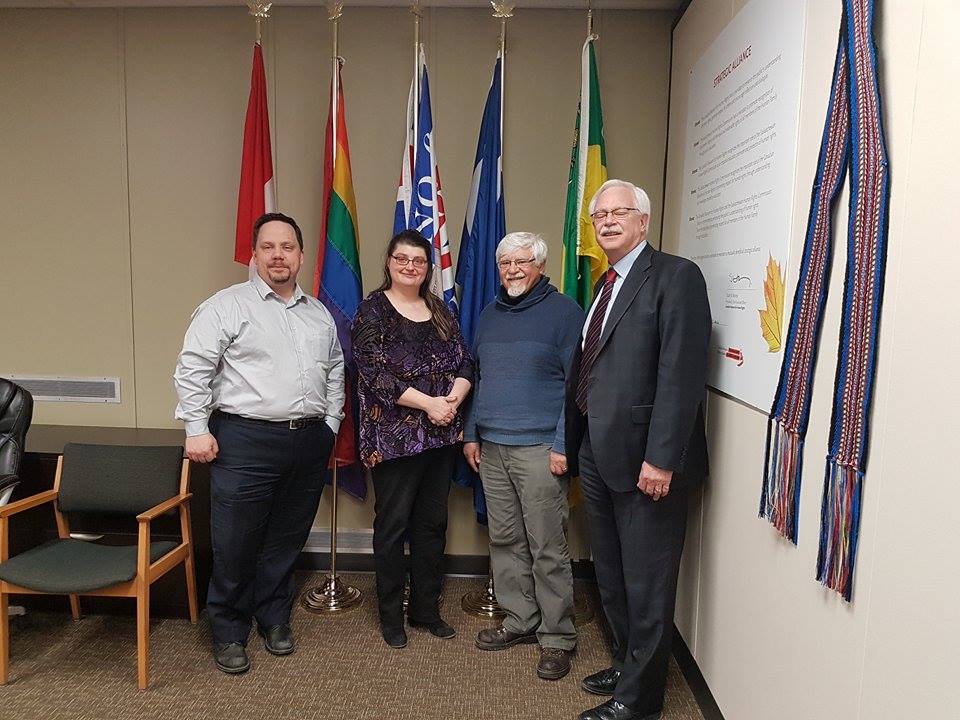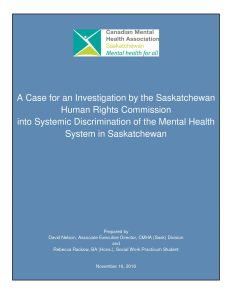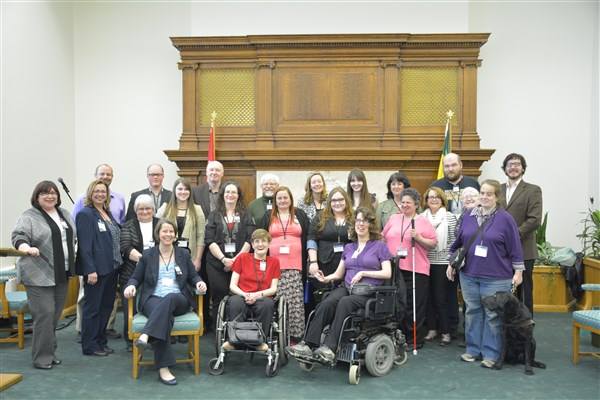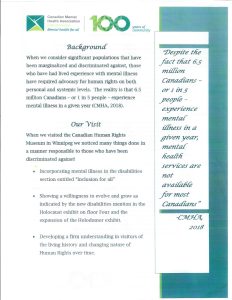Menu
Close
SK. Advocacy
May 26, 2020
CMHA Saskatchewan provides Advocacy, helping to identify resources to assist consumers of mental health services. CMHA Saskatchewan Division Staff provide support to mental health consumers, their families and supporters to contribute to meaningful solutions which can help lead to a better quality of life.
Advocacy Highlights
Systemic Discrimination
-
Introduction

A Case for an Investigation by the Saskatchewan Human Rights Commission into Systemic Discrimination of the Mental Health System in Saskatchewan was written in response to the lack of resources behind the Working Together for Change: The Mental Health and Addictions Action Plan, created in 2014. It is a ten-year plan which outlines seven recommendations as system goals to improve mental health and addictions services in Saskatchewan. We compared this initiative’s lack of resources to other initiatives that were implemented within the last few years. It was woefully underfunded. We did not want this action plan to sit on a shelf with very little action, as had happened with previous initiatives towards mental health and addictions. In 2016, we went to the Saskatchewan Human Rights Commission to present our case of systemic discrimination. Since then, we have written a recommendation document and, if you read through it, some of those recommendations have been met! The Saskatchewan Human Rights Commission has also since created a position, Director of Systemic Initiatives, that works directly with cases such as this one.
-
Working Together for Change
 Working Together For Change: A 10 Year Mental Health and Addictions Action Plan for Saskatchewan
Working Together For Change: A 10 Year Mental Health and Addictions Action Plan for SaskatchewanDr. Fern Stockdale Winder
Commissioner, Mental Health and Addictions Action Plan December 1, 2014Working Together for Change
-
A Case for an Investigation
 A Case for an Investigation by the Saskatchewan Human Rights Commission into Systemic Discrimination of the Mental Health System in Saskatchewan
A Case for an Investigation by the Saskatchewan Human Rights Commission into Systemic Discrimination of the Mental Health System in SaskatchewanPrepared by
David Nelson,
Senior Consultant, CMHA (Sask) Division
Rebecca Rackow, BA (Hons.), BSW, RSW
Director of Advocacy, Research, and Public Policy Development
November 16, 2016CMHA Mental Health Discrimination Investigation
-
Mental Health & Addictions Care
 A Responsible Vision and Plan for Mental Health and Addictions Care in Saskatchewan
A Responsible Vision and Plan for Mental Health and Addictions Care in SaskatchewanPrepared by
Rebecca Rackow, BA(hons.), BSW, RSW,
Sharon Lyons BA, MA(Cand.),
David Nelson
For the Canadian Mental Health Association (Saskatchewan Division) Inc. April 2018A Responsible Vision and Plan
DISC and SAID Programs
-
Introduction
 The Saskatchewan Disability Income Support Coalition (DISC) was formed by a large cross section of disability advocates, consumers and organizations across Saskatchewan who are committed to advocating for a respectful, dignified and adequate income support system. DISC members have joined together to speak as one voice, working towards a distinct (or separate) income system for people with disabilities that will be built on our common vision and principles.
The Saskatchewan Disability Income Support Coalition (DISC) was formed by a large cross section of disability advocates, consumers and organizations across Saskatchewan who are committed to advocating for a respectful, dignified and adequate income support system. DISC members have joined together to speak as one voice, working towards a distinct (or separate) income system for people with disabilities that will be built on our common vision and principles.The Saskatchewan Assured Income for Disability (SAID) is an income support program for people with significant and enduring disabilities. It offers individuals the dignity of greater choice of services and participation in their community. Government and members of the disability community continue to work together to make improvements to the SAID program.
-
Final Recommendations of the Task Team
 Final Recommendations of the Task Team on Income Support for People with Disabilities
Final Recommendations of the Task Team on Income Support for People with DisabilitiesMay 13th, 2009
Final Recommendations of the Task Team
-
Saskatchewan Assured Income for Disabilities
 Saskatchewan Assured Income for Disabilities:
Saskatchewan Assured Income for Disabilities:
An Income Replacement programDave Nelson, RSW(ret.), RPN(ret.)
Rebecca Rackow, BA(hons.), BSW, RSWMay 13th, 2009
SW DISC-SAID Class Presentation
-
The Challenges of Living on SAID 2016
The Saskatchewan Assured Income for Disability (SAID) is an income support program for people with significant and enduring disabilities. In the following video, you’ll meet a group of SAID recipients and learn how rising costs are creating challenges for daily living.
-
Additional Links
 Changes to rental supplement ‘short-sighted,’ Sask. housing advocates say
Changes to rental supplement ‘short-sighted,’ Sask. housing advocates sayPlan to phase out Sask. Rental Housing Supplement ‘an indecent move,’ says NDP critic
Our primary vision is to see an income system that offers both an adequate baseline income for people with disabilities and a user-friendly mechanism to address individual financial needs based on the impact of disability.
The Saskatchewan Assured Income for Disability (SAID) is an income support program for people with significant and enduring disabilities.
Canadian Museum For Human Rights
-
Introduction

In a family visit to the Human Rights Museum in August 2018, our Director of Advocacy, Research, and Public Policy Development, Rebecca Rackow was very impressed with the museum overall. However, she did notice some obvious gaps in the mental health and addictions areas in the various displays. In contacting our sister Canadian Mental Health Association (CMHA) Division in Manitoba, we discovered they too had been communicating with the museum regarding improvements to the various displays to more effectively convey human rights discrimination.
-
Canadian Human Rights Museum – Recommendations
 Canadian Human Rights Museum
Canadian Human Rights Museum
Recommendations PDF2018
Canadian Human Rights Museum – Recommendations
-
Upholding Human Rights
 Upholding Human Rights CMHA Sask. Division Involvement in Enhancing the Mental Health and Addictions Component at the Canadian Human Rights Museum in Winnipeg
Upholding Human Rights CMHA Sask. Division Involvement in Enhancing the Mental Health and Addictions Component at the Canadian Human Rights Museum in WinnipegPrepared by:
David Nelson, RPN(Ret.), RSW(Ret.)
Associate Executive Director, CMHA (Sask) Division
Rebecca Rackow, BA(Hons.), BSW, RSW,
Director of Advocacy, Research, and Public Policy DevelopmentUpholding Human Rights
 DISC Website
DISC Website DISC Website
DISC Website